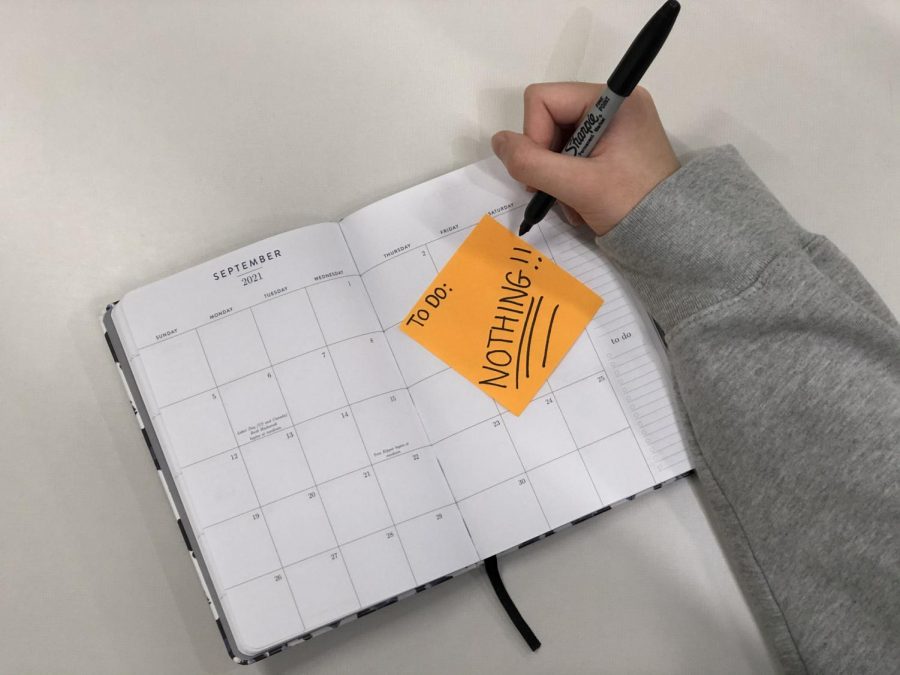Sophomores Should Have Open Campus
Study halls do not provide the best environment to study.
October 1, 2020
Two hours and five minutes. If I was just a grade or two older, I could be spending that time doing schoolwork or something to get my mind off of a stressful day at school in order to do what is best for me and my learning. However, I am a sophomore. A consequence I have to face due to that fact is not having an open campus like the upperclassman do. Therefore, I have to sit in a cafeteria with nothing to do, being bored out of my mind, for over two hours just because of my grade. If sophomores were allowed to have an open campus, we would be able to get our work done in a comfortable environment, get a break from the school day, learn time management skills, and most importantly do more productive things with our time than sit in a cafeteria or study hall.
Haley Winter ’23 is unlike many other students with the fact that she has a study hall. Some students thrive in study halls and do well when they work in a classroom environment. However, learning is very individual and many would be more comfortable elsewhere. “Most of the last week I had had it [study hall], I just sat there and did absolutely nothing,” Winter said. “Sometimes I try to work really hard and get stuff done, but even then it’s super stressful because it’s a period just for you to do your work for other classes. But then, I can’t focus because it’s school and there is so much going on, there’s so many distractions, and people.”
Winter is not alone in this as the stressful, pressure-filled environment makes it difficult for students to get their work done. “A lot of times we go through study halls, we might not see kids doing a lot but they always have something they could be doing,” Principal Ryan Woods said. “Most students have homework and schoolwork they could be doing. Some just choose to do it later, at home, or other places. That’s their choice, but the goal is that we provide a place to do that and there’s a teacher there to support them.” The issue with this is that for the students who choose to not do their work in a study hall due to the environment, could be using that time more productively if they were just allowed to leave campus and go where they feel most comfortable.
In some cases, students may not have much or any work to get done during the day. Occasionally, they might need a break from their taxing school days and having an open campus would offer that. “I think [open campus] will definitely affect [school] for the better because you get a break and you get to go outside, have fresh air, and it’s just a break out of the school day,” Emma Puckett ’23 said. “Yeah, you can go out into the courtyard for lunch, but it’s not the same because you’re still surrounded by the school.” Like she explained, going out to the courtyard is not the same intermission students are hoping for because they feel like their school day hasn’t been paused since they are still at school.
According to Learningliftoff.com, “Breaks can be an essential part of learning effectively, and they may even improve a students’ quality of life.” The only breaks school offers are the five minute passing periods which are used to get students to their next class, and a 30 minute lunch period. Passing periods do not provide nearly enough time for a mental break and both those and lunchtime are still part of the stresses in school and not legitimate breaks. The best way to offer students the downtime some desperately need is to allow them to leave the place that is making them feel that way.
Open campus also teaches students time management skills. This is because students have to stay organized to make sure they come back to school on time. Being good with time management is important throughout your whole life. Whether it is to keep up with your class times or make it to work on time when you are an adult, it will always be necessary. Students will quickly learn that if they do not keep track of time they will face consequences. These are being tardy and missing important class time which could affect their workload since they will have to work on what they missed at a later time.
Woods believes the best way to suit his students’ needs is to keep them in a study hall. “If you look at our transition data… what we’d see is a lot of sophomores struggle when they first come to the high school,” Woods said. “Academically, socially, and emotionally, a lot of things are going on, so again, for us it makes more sense to have a sophomore in a study hall, where there’s a teacher to support the work they need to do, versus, just turn them loose and tell them good luck out there on their own where they may or may not do their schoolwork, they may get farther behind.”
Although Woods has some valid reasoning, study halls instead of open campus are simply not the answer for every student. In order for all students to succeed, they need different options. The best way to suit every student’s needs is to assess their needs individually. For some, an open campus would provide a way for them to excel and for others, the best thing to do is be in a study hall. I believe that both options should be offered to sophomores because study halls are not a one size fits all.






